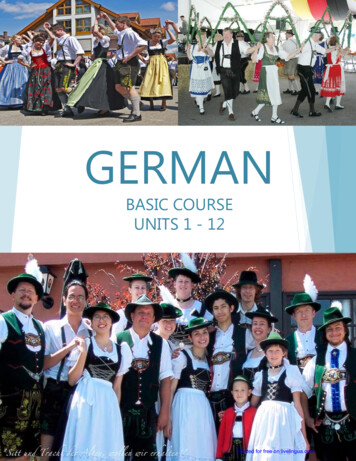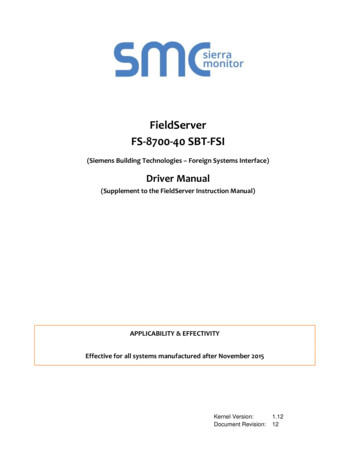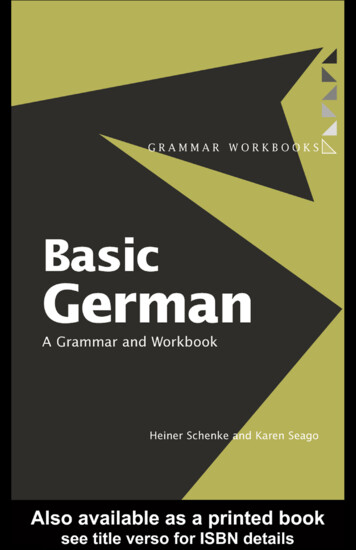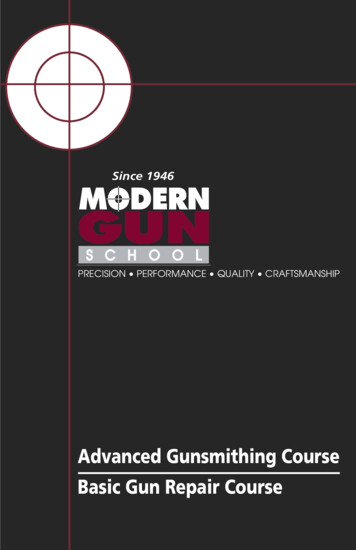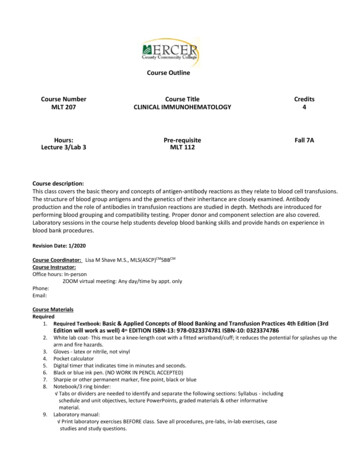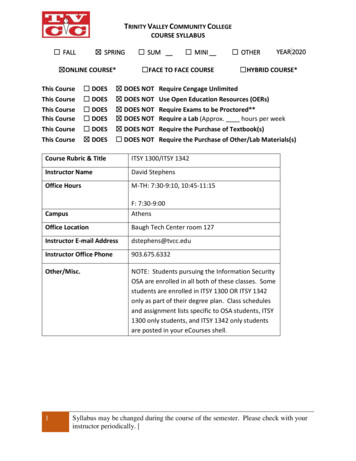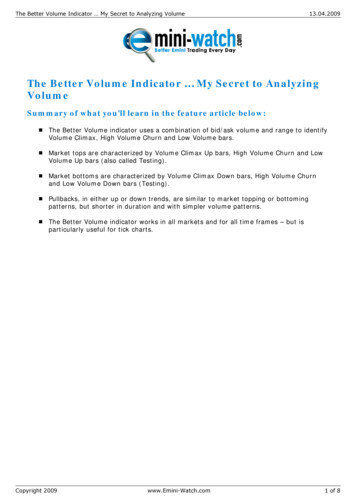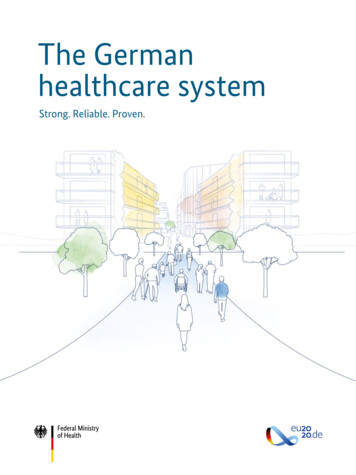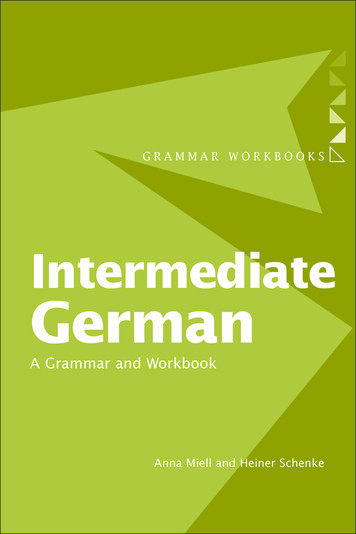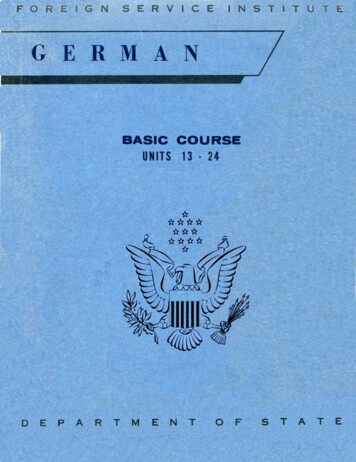
Transcription
FOREIGNSERVICEINSTITUTEGER M ABASIC COURSEUNITS 13· 24oEPARTMENT0FSTATE
GERMANBASIC COURSEUNITS 13· 24SAMUEl A. BROWNMaria-luise BissonnetteMargarete PlischkeFriedrich lehmannErika QuaidWilliam R. van BuskirkFOREIGN SERVICE INSTITUTEWASHINGTON, D.C.1965o E PAR T M E N T0FSTATE
GERMANFOREIGN SERVICE INSTITUTEBASIC COURSE St'RIASEdited byLU)}'/)B. SWIFTFor sale by the Superintendent 01 Documents. V.S. Government PrintingWashington. D.C. 20402Stock No. 044-000-00260-41 Catalog No. S 1.1l4/2:U31/Vnits 13-24omee
GERMANPREFACEThis second volume o[ the FSI German Basic Course, designed to [ollowdirectly the first volume published in 1961, is dedicated to the late SAMUEL A.BROWH. Be[ore his death Dr. Brown had substantially [inished his work on units13-21, which were prepared as a prepublication release early in 1965 under thedirection o{ Dr. Ronald A. C. Goodison. Chairman o{ the Department o{ North andEast European Languages. The final units and the glossary have been prepared,in the spirit o{ the notes le{t by Dr. Brown. under the direction o{ Dr. WilliamR.van B uskirk.The dialogs and drill materials were prepared by Mrs. Maria-Luise Bissonnette, Mr. Friedrich Lehmann, Mrs. Margarete Plischke and Mrs. Erika Quaid.Mrs. Quaid also typed this entire volume in its final form. The tape recordingsto accompany the text were recorded in the studio o{ the FSI language laboratoryunder the supervision o{ Mr. Gary Alley.The work thus completed was the principal writing project o{ Dr. Brown'slast years and is o{{ered, by all who shared in the work, as a monument to hismemory./1l# yA--Iloward E. Sollenberger, DeanSchool o{ Language and Area StudiesForeign Service Institutei
BASIC COURSEGERM.:A.::.N ---C'---O'---N T E NT STABLE OF CONTENTSUNITS 13 - 24UnH 13Basic Sentences:Unterhaltungen auf und nach einer GesellschaftNotes to the Basic SentencesNotes on Gramrnar: A. Verbs.The Past Tense FormsB. Past Tense. UsageC. Past Participles as Adjectives and AdverbsD. Derivative Adjectives and AdverbsE. Time ExpressionsSubstitution DrillConversion DrillPart IPart 11Variation DrillVocabulary DrillTranslation DrillResponse DrillSituationsNarrativeFinder ListUnit 14Basic Sentences:Eine Reise mit dem ZugNotes to the Basic SentencesNotes on Grarnrnar: A. Verbs. The Pluperfect PhraseB. Verbs. The Infinitive and the Infinitive PhraseC. Time Expressions: wann, wenn and lsSubstitution DrillVariation Drillvocabulary DrillTranslation DrillResponse DrillSituationsNarrativeFinder ListUnH 1:Basic Sentences:Besuch in BerlinNotes to the Basic SentencesNotes on Grarnrnar: A. Verbs. The Passive PhraseB. The Infinitive Phrase with seinC. The Indefinite Pronoun manD. Place Names as Mödifier-sE. Prepositions: diesseits, jenseitsSubstitution DrillPart IPart 11Variation DrillConversion DrillPart IPart 11Part 111Vocabulary DrillTranslation DrillResponse DrillSituationsNarrativeFinder Listiii3353403 11 03 '·83493503513523533 ;0: 9391392393395402402400;2l0 't06406407408lil0414415416417421422424425L 26
CONTENTSGERMANUnit 16ReisepläneBasic Sentences:Notes on Grammar: A. Relative Clauses and Relative PronounsB. Demonstrative PronounsC. Time ExpressionsD. Prepositions - Special Uses of an, auf, zusubstitution DrillVariation Drillvocabulary DrillTranslation DrillResponse DrillSituationsNarrativeFinder ListUnH 17Basic Sentences:EinkaufspläneNotes to the Basic sentencesNotes on Grammar: A. Prepositions - Summary and ReviewB. Conjunctions - Summary and ReviewC. Infinitives - Summary and ReviewSubstitution DrillVariation DrillVocabulary DrillVerb and Preposition DrillPart IPart 11Translation DrillResponse DrillSituationsNarrativeFinder ListUnH 18Basic Sentences:Beim ArztNotes to the Basic SentencesNotes on Grammar: A. Verbs. The Unreal or Subjunctivehätte, könnte, wäre, wÜrdeB. Prepositions - ausser, statt, trotz, wegenC. Verbs and Prepositions ----- ----D. Conjunctions - dennE. The Indefinite Relative Pronoun - wasSubstitution DrillVariation DrillVocabulary DrillVerb and Preposition DrillPart IPart 11Translation DrillResponse DrillSituationsNarrativePart IPart 11Finder ListivBASIC 13514515515516519524529533534536537538540541
BASIC COURSEGERMANUnH 19Basic Sentences:In der visa-AbteilungNotes to the Basic SentencesNotes on Grammar: A. The Unreal or Subjunctive - Present andPast possibilityB. The Special Conditional clauseC. Unreal Wishes - Present and PastD. The Unreal after als obE. Indefinite Pronouns-- eine , jemand, niemandF. Omission of the SpecifierG. Word Order - Nouns and PronounsSubstitution DrillPart IPart 11variation Drillvocabulary DrillTranslation DrillResponse DrillNarrativeFinder ListUnit 20Basic Sentences:OpernbesuchNotes to the Basic SentencesNotes on Grammar: A. Verbs. The Auxiliary Verbs dürfen,können, möchte(n), müssen, sOIIe wolle B. Verbs. The Unreal or Subjunctive Phraseshätte gern Past Participle andware- Past ParticipleSubstitution DrillVariation DrillPart IPart 11vocabulary DrillTranslation DrillResponse DrillNarrativeFinder ListUnH 21Basic Sentences:PolitischesNotes to the B sic SentencesNotes on Grammar: A. Sentence Types - Compound andComplex SentencesB. Complex Sentences - Direct and IndirectDiscourseSubstitution DrillConversion DrillVariation DrillTranslation DrillResponse DrillNarrativeFinder ListvCONTENTS' 1 :"2:--'3'"3 4 .c.::c:::656.-; 8 '60562567 70 '72 73575577581582586c:87j8859159 597 ·9560060160 360760860861061261662062262362';
CONTENTSGERMANUnit 22--sasie Sentences:Autofahren in DeutschlandNotes to the Basic SentencesNotes on Grammar: A. Conditional clausesB. Indirect DiscourseSubstitution Drillvariation DrillVocabulary DrillTranslation DrillResponse DrillNarrativeFinder ListInternational SignsUni1.:.21Basic Eentences:Im Amerikanischen HandelszentrumNotes on Grammar: A. Present Form of le SubjunctiveB. Free Interchange of Past andPresent Tense SubjunctiveC. Time and TensesD. Special Uses of the Present FormSubstitution DrillConversion DrillVariatio!1 DrillTranslation DrillP.esponse Dr illNarrativeFinder ListUnit 24--Extended Adjective Construc ionsA. Present ParticipleB. Present Participle with zuC. Past ParticipleD. Adjective and AdverbConversion DrillFinder ListGlossaryBASIC 78vi
BASIC COU,- R- SEU -N:.:.:.:IT --- 1 3G E .cR - -M:.:::A:.::.:.:N'----UNTERHALTUNGEN AUF UND NACH EINER GESELLSCHAFTBasic SentencesIIthe exhibitiondie Ausstellung,-enloofR. KELLERHERR KELLERHave you been to the Paul Kleeexhibition yet?Waren Sir schon in der Paul KleeAusstellung?hadup to nowto go (to some place)hattebisherhinzugehenHERR BRUCENo, up to now I haven't had time togo.on weekdaysOn weekdays I have too much to do.on SundaysclosedAnd on Sundays it is closed, isn't it?Nein, ich hatte bisher noch keineZeit hinzugehen.wochentagsWochentags habe ich zuviel zu tun.sonntagsgeschlossenUnd sonntags ist sie dochnicht wahr?as far as I knowdaily, ever.y dayopensoviel ich weisstäglichgeöffnetMR. KELLERHERR KELLERNo, as far as I know it's open everyday.twiceMy wife and I have already been theretwice.we liked itextraordinarily, extremelyWe liked the exhibiti0i1 extremclyweil.DREIHUNDERTFONFUNDDREISSIGges hlosscn.Nein, soviel ich weiss, ist sietäglich geöffnet.zweimalMeine Frau und ich waren schonzweimal dort.es gefiel unsausgesprochenUns gefiel die Ausstellung ausgesprochen gut.335
UNIT13BASIC COURSEGERMANIIIIthoughtyou would be , you werethe leave, vacationon leavedachteSie wärender Urlaub,-eim UrlaubMR. BERGMANNHERR BERGMANNI thought you were still on leave.Ich dachte, Sie wären noch im Urlaub.kamen . zurückcame backHERR JONESWe came back yesterday afternoon.Wir karnen gestern nachmittagzurück.HERR BERGMANNMR. BERGMANNWere you in Garmisch-Partenkirchenthe whole time?Waren Sie die ganze Zeit in GarmischPartenkirchen?HERR JONESMR. JONESYes, and we liked it there very much.MR. BERGMANNWere you lucky as far as the weatherwas concerned?Es gefiel uns dort sehr gut.HERR BERGMANNHatten Sie Glück mit dem Wetter?whenarrivedwas rainingto be surethe rest, remainderalsankamenregnetezwarder Rest.MR. JONESHERR JONESWhen we arrived it was raining (tobe sure), but the rest of the weekwas very nice.Als wir ankamen, regnete es zwar,aber der Rest der Woche war sehrschön.made, didthe tour, tripthe hike in the mountainsmachtendie Tour,-endie Bergtour,-enMR. BERGMANNHERR BERGMANNDid you go on hikes in the mountains,too?several336Ja.Machten Sie auch Bergtouren?mehrereDREIHUNDERTSECHSUNDDREISSIG
GERMANBASIC COURSEMR. JONESYes, we went on several as a matterof fact.to spend (time)spentAnd where did you spend yourvacation?13UNITHERR JONESJa, sogar mehrere.verbringen (a,a)verbrachtenUnd wo verbrachten Sie Ihren Urlaub?wentthe treatment, cureto go to a spa to take thewatersfuhrendie Kur,-enzur Kur fahren (ä,u,a) istMR. BERGMANNHERR BERGMANNWe went to take the waters at BadPyrmont.the return tripon the way backthe side tripthe industrythe fair, expositionOn the way back we took a side trip toHannover, in order to visit theindustrial exposition.IIIWir fuhren zur Kur nach Bad Pyrmont.dieauf--derdiedieRückreiseder RückreiseAbstecher,Industrie,-nMesse,-nAuf der RUckreise machten wir einenAbstecher nach Hannover, um dieIndustriemesse zu besuchen.IIIthe economythe ministrythe Ministry of EconomicAffairsdie Wirtschaftdas Ministerium,-iendas WirtschaftsministeriumMR. MEYERHERR MEYERWere you at the Ministry of EconomicAffairs for the conference yesterday?Waren Sie gestern zur Konferenz imWirtschaftsministerium?was able, couldthe (German) Ministry ofForeign Affairskonntedas Auswärtige AmtMR. KELLERHERR KELLERNo, unfortunately I couldn't go, sinceI had an urgent conference at theMinistry of Foreign n, ich konnte leider nicht hingehen, da ich eine dringende Besprechung im Auswärtigen Amt hatte.interessant337
UNIT13GERMANMR. MEYERToo bad;you see.it was very interesting,gavethe reportthe combinethe formationthe formation of a combineor corobinesthe cartelthe cartel questionKr. Schumann gave areport on newcombines being formed and cartelquestions.HERR MEYERSchade, es war nämlich eBildung,-enKonzernbildung,-endas Kartell,-edie Kartellfrage,-nHerr Schumann gab einen Bericht überneue Konzernbildungen undKartellfragel'\.stood, wasit's in the newspaperthe other dayalreadystandes steht in der Zeitung (a,a)neulichbereitsMR. KELLERHERR KELLERThere was (alreaoy) an articlc aboutthat in the "Frankfurter Allgemeine"the other day.Darüber stand neulich bereits einArtikel in der Frankfurter Allgemeinen.detailed, completeausführlichMR. MEYERHERR MEYERYes, but it wasn't very complete.Ja, aber der war nicht sehr ausführlich.something arises, developssomething arose, developedthe discussiones kommt zu etwas (a, 0)es kam zu etwasdie Diskussion,-enKR. KELLERHERR KELLERDid a discussion arise afterwards?Kam es danach zu einer Diskussion?to be sufficientwas sufficientausreichen (w)reichte . ausMR. MEYERHERR MEYERThere wasn't sufficient time,unfortunately.the labor unionthe union official (secretary)whopresentthe (industrial) plantthe plant manager338BASIC COURSEDie Zeit reichte leider nicht aus.die Gewerkschaft,-ender Gewerkschaftssekretär,-ederanwesendder Betrieb,-eder Betriebsleiter,DREIHUNDERTACHTUNDDREISSIG
BASIC COURSEUNIT 13GERMANlong-windedthe explanatory statementto give out (with)gave out (with)There was a union official there who ave out with long-winded explanations n answer to a question raised by aplant manager.langatmigdie Erklarung,-enabgeben (i, a, e)abgabEs war ein Gewerkschaftssekretaranwesend , der auf die Frage einesBetriebsleiters langatmige Erklarungenabgab.IVIVafterthe social affair, partyMr. Martin calls up Mrs. Köhler onthe morning after the party.nach (plus dative)die Gesellschaft,-enHerr Martin ruft Frau Köhler amMorgen nach der Gesellschaft an.to express one's thankssich bedankenMR. MARTINHERR MARTINMrs. Köhler, l'd like to expressmy thanks [to you] again for thepleasant evening.(w)Gnadige Frau, ich möchte mich nochmal für den netten Abend bedanken.to be gladsich freuenMRS. KOHLERFRAU KOHLER(w)My husband and I were very glad thatyou could come.Mein Mann und ich haben uns sehr gefreut, dass Sie kommen konnten.Too bad that your wife wasn't withus too.Schade, dass Ihre Frau nicht auchdabei war.MR. MARTINYes, but she'll be back again in aweek, and then I hope we'll be seeingyeu here at our house very soon.HERR MARTINJa, - aber in acht Tagen wird siewieder hier sein und dann sehen wirSie hoffentlich recht bald bei uns.MRS. KOHLERWe'll be very glad to come.FRAU KOHLERWir werden sehr gern kommen.to ask for, requestthe commendation, regardsyour husband, Mr bitten um (a,e)die EmpfehlungIhr Herr GemahlMR. MARTINHERR MARTINPlease give my regards to Mr. Köhler.Ich bitte um eine Empfehlung an IhrenHerrn Gemahl.MRS. KOHLERThank you.Good-bye, Mr. Martin.MR. MARTINGood-bye, Mrs. Köhler.DRElHUNDERTNEUNUNDDREISSIGFRAU KOHLERDanke.Auf Wiedersehen, Herr Martin.!:IERR MARTINAuf Wiedersehen, gnädige Frau.339
UNITBASIC COURSEGERMAN13Notes to the Basic Sentences1Es war ein Gewerkschaftssekretär anwesend. German sometimes uses es toanticipate the true grammatical subject of a sentence.English uses theword there in the same way.The equivalent German and English sentencesare: Ein Gewerkschaftssekretär war anwesend.A union official was there.Notes on Grammar(For Horne Study)A.VERBS.THE PAST TENSE FORMSI. In Unit 12 we were concerned with only two of the devices for talking aboutpast time in German: the PERFECT PHRASE and the construction using aPRESENT TENSE form of the verb plus an expression of time. We noted howeverthat both German and English have a special verb form which is also usedto talk about past tim
BASIC COURSE GERMAN CONTENTS UnH 19 Basic Sentences: In der visa-Abteilung Notes to the Basic Sentences Notes on Grammar: A. The Unreal or Subjunctive - Present and Past possibility B. The Special Conditional clause C. Unreal Wishes - Present and Past D. The Unreal after als ob E. Indefinite Pronouns--eine , jemand, niemand F. Omission of the .
